Analysis of Aldi's Integrated Logistics Management: A Detailed Report
VerifiedAdded on 2021/02/19
|8
|1506
|33
Report
AI Summary
This report provides a comprehensive analysis of Aldi's integrated logistics management, focusing on the critical relationships between logistics, customer relationship management (CRM), procurement, and operations planning. The study examines how Aldi, a major player in the retail industry, utilizes various strategies to meet customer demands efficiently. It highlights the importance of CRM in managing customer data and interactions, as well as the role of procurement in acquiring raw materials and finished goods. Furthermore, the report delves into the significance of operations planning in converting raw materials into finished products, and the integration of these elements within Aldi's supply chain. The report also explores areas like transportation, packaging, and warehousing, while offering recommendations to improve logistics performance. Finally, it discusses the application of big data analytics to enhance integrated logistics management within the company, demonstrating how Aldi leverages these interconnected functions to optimize its supply chain and maximize profitability. The report uses sources like Schönsleben (2018), Payne and Frow (2015), Lambert and Schwieterman (2016), Boyce, Mano and Kent (2016), and Christopher, Mena and van Hoek (2018) to support its analysis.
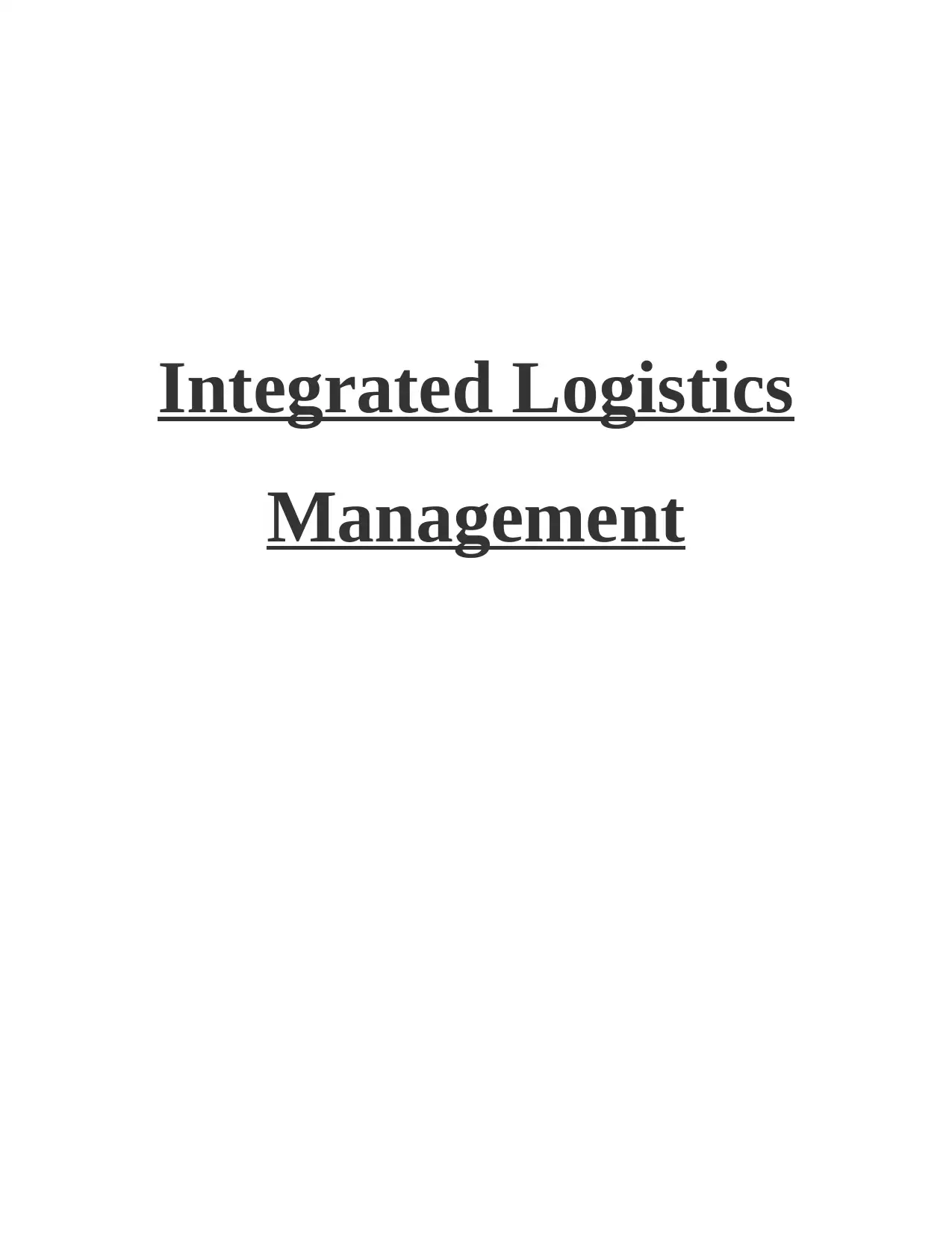
Integrated Logistics
Management
Management
Paraphrase This Document
Need a fresh take? Get an instant paraphrase of this document with our AI Paraphraser
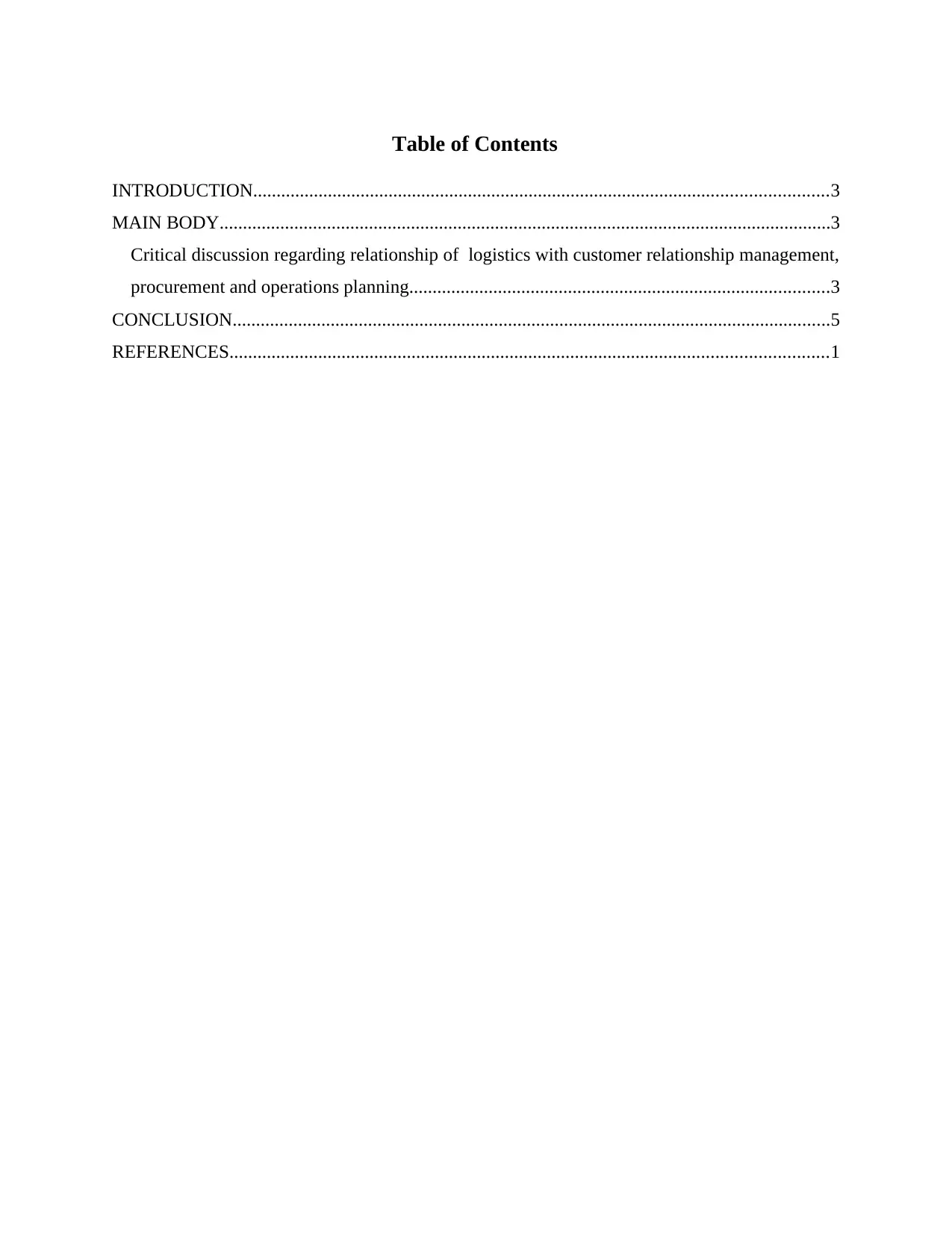
Table of Contents
INTRODUCTION...........................................................................................................................3
MAIN BODY...................................................................................................................................3
Critical discussion regarding relationship of logistics with customer relationship management,
procurement and operations planning..........................................................................................3
CONCLUSION................................................................................................................................5
REFERENCES................................................................................................................................1
INTRODUCTION...........................................................................................................................3
MAIN BODY...................................................................................................................................3
Critical discussion regarding relationship of logistics with customer relationship management,
procurement and operations planning..........................................................................................3
CONCLUSION................................................................................................................................5
REFERENCES................................................................................................................................1
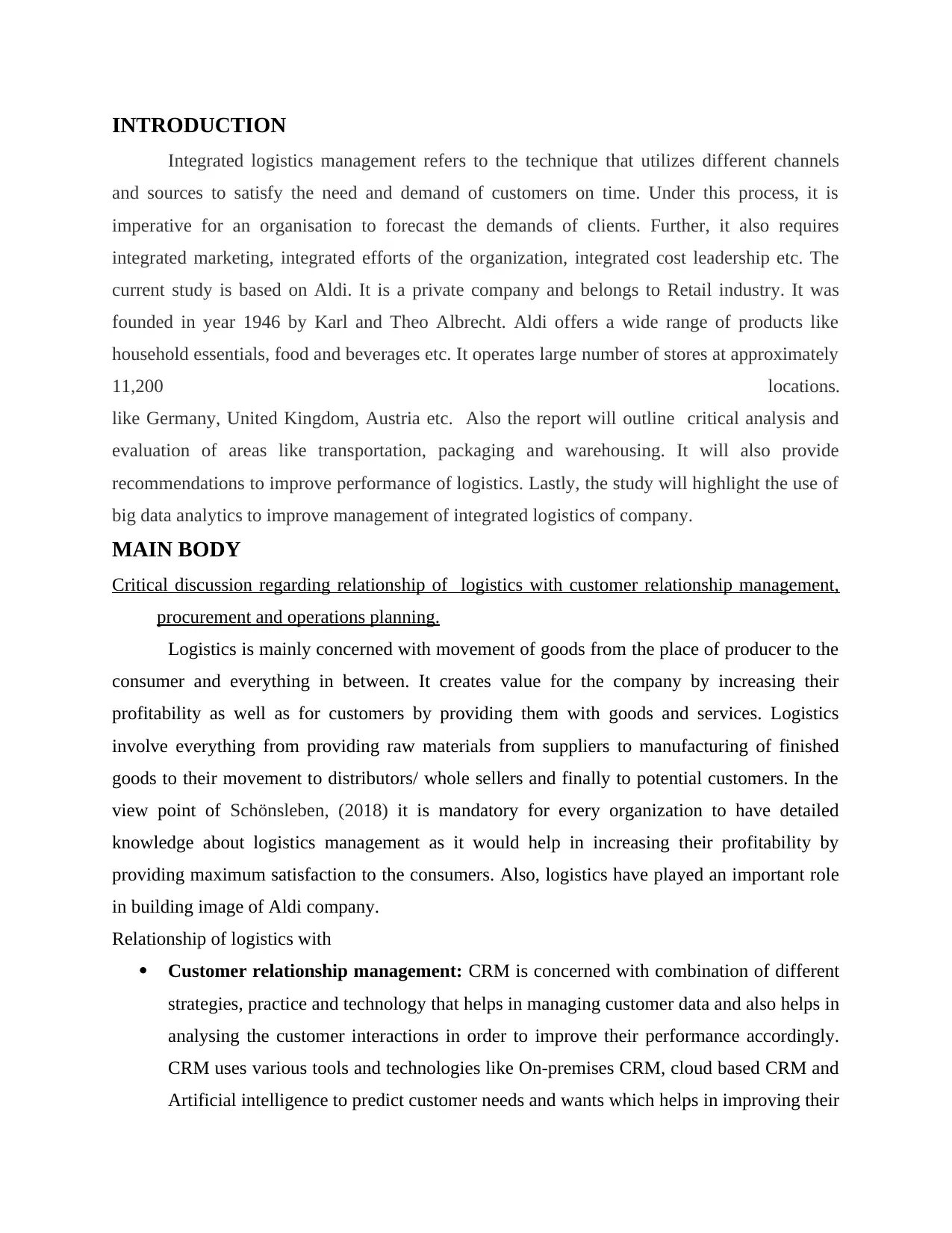
INTRODUCTION
Integrated logistics management refers to the technique that utilizes different channels
and sources to satisfy the need and demand of customers on time. Under this process, it is
imperative for an organisation to forecast the demands of clients. Further, it also requires
integrated marketing, integrated efforts of the organization, integrated cost leadership etc. The
current study is based on Aldi. It is a private company and belongs to Retail industry. It was
founded in year 1946 by Karl and Theo Albrecht. Aldi offers a wide range of products like
household essentials, food and beverages etc. It operates large number of stores at approximately
11,200 locations.
like Germany, United Kingdom, Austria etc. Also the report will outline critical analysis and
evaluation of areas like transportation, packaging and warehousing. It will also provide
recommendations to improve performance of logistics. Lastly, the study will highlight the use of
big data analytics to improve management of integrated logistics of company.
MAIN BODY
Critical discussion regarding relationship of logistics with customer relationship management,
procurement and operations planning.
Logistics is mainly concerned with movement of goods from the place of producer to the
consumer and everything in between. It creates value for the company by increasing their
profitability as well as for customers by providing them with goods and services. Logistics
involve everything from providing raw materials from suppliers to manufacturing of finished
goods to their movement to distributors/ whole sellers and finally to potential customers. In the
view point of Schönsleben, (2018) it is mandatory for every organization to have detailed
knowledge about logistics management as it would help in increasing their profitability by
providing maximum satisfaction to the consumers. Also, logistics have played an important role
in building image of Aldi company.
Relationship of logistics with
Customer relationship management: CRM is concerned with combination of different
strategies, practice and technology that helps in managing customer data and also helps in
analysing the customer interactions in order to improve their performance accordingly.
CRM uses various tools and technologies like On-premises CRM, cloud based CRM and
Artificial intelligence to predict customer needs and wants which helps in improving their
Integrated logistics management refers to the technique that utilizes different channels
and sources to satisfy the need and demand of customers on time. Under this process, it is
imperative for an organisation to forecast the demands of clients. Further, it also requires
integrated marketing, integrated efforts of the organization, integrated cost leadership etc. The
current study is based on Aldi. It is a private company and belongs to Retail industry. It was
founded in year 1946 by Karl and Theo Albrecht. Aldi offers a wide range of products like
household essentials, food and beverages etc. It operates large number of stores at approximately
11,200 locations.
like Germany, United Kingdom, Austria etc. Also the report will outline critical analysis and
evaluation of areas like transportation, packaging and warehousing. It will also provide
recommendations to improve performance of logistics. Lastly, the study will highlight the use of
big data analytics to improve management of integrated logistics of company.
MAIN BODY
Critical discussion regarding relationship of logistics with customer relationship management,
procurement and operations planning.
Logistics is mainly concerned with movement of goods from the place of producer to the
consumer and everything in between. It creates value for the company by increasing their
profitability as well as for customers by providing them with goods and services. Logistics
involve everything from providing raw materials from suppliers to manufacturing of finished
goods to their movement to distributors/ whole sellers and finally to potential customers. In the
view point of Schönsleben, (2018) it is mandatory for every organization to have detailed
knowledge about logistics management as it would help in increasing their profitability by
providing maximum satisfaction to the consumers. Also, logistics have played an important role
in building image of Aldi company.
Relationship of logistics with
Customer relationship management: CRM is concerned with combination of different
strategies, practice and technology that helps in managing customer data and also helps in
analysing the customer interactions in order to improve their performance accordingly.
CRM uses various tools and technologies like On-premises CRM, cloud based CRM and
Artificial intelligence to predict customer needs and wants which helps in improving their
⊘ This is a preview!⊘
Do you want full access?
Subscribe today to unlock all pages.

Trusted by 1+ million students worldwide
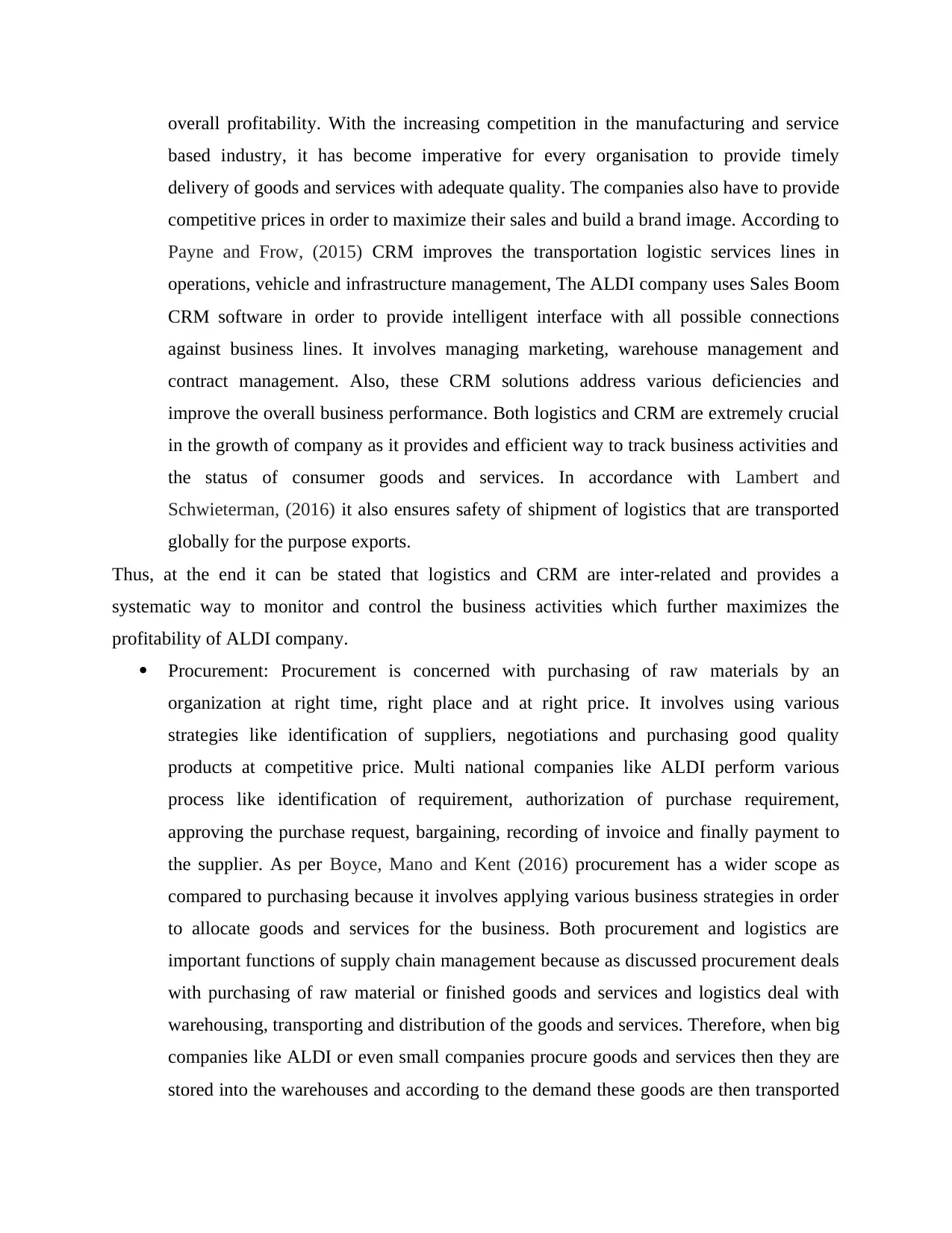
overall profitability. With the increasing competition in the manufacturing and service
based industry, it has become imperative for every organisation to provide timely
delivery of goods and services with adequate quality. The companies also have to provide
competitive prices in order to maximize their sales and build a brand image. According to
Payne and Frow, (2015) CRM improves the transportation logistic services lines in
operations, vehicle and infrastructure management, The ALDI company uses Sales Boom
CRM software in order to provide intelligent interface with all possible connections
against business lines. It involves managing marketing, warehouse management and
contract management. Also, these CRM solutions address various deficiencies and
improve the overall business performance. Both logistics and CRM are extremely crucial
in the growth of company as it provides and efficient way to track business activities and
the status of consumer goods and services. In accordance with Lambert and
Schwieterman, (2016) it also ensures safety of shipment of logistics that are transported
globally for the purpose exports.
Thus, at the end it can be stated that logistics and CRM are inter-related and provides a
systematic way to monitor and control the business activities which further maximizes the
profitability of ALDI company.
Procurement: Procurement is concerned with purchasing of raw materials by an
organization at right time, right place and at right price. It involves using various
strategies like identification of suppliers, negotiations and purchasing good quality
products at competitive price. Multi national companies like ALDI perform various
process like identification of requirement, authorization of purchase requirement,
approving the purchase request, bargaining, recording of invoice and finally payment to
the supplier. As per Boyce, Mano and Kent (2016) procurement has a wider scope as
compared to purchasing because it involves applying various business strategies in order
to allocate goods and services for the business. Both procurement and logistics are
important functions of supply chain management because as discussed procurement deals
with purchasing of raw material or finished goods and services and logistics deal with
warehousing, transporting and distribution of the goods and services. Therefore, when big
companies like ALDI or even small companies procure goods and services then they are
stored into the warehouses and according to the demand these goods are then transported
based industry, it has become imperative for every organisation to provide timely
delivery of goods and services with adequate quality. The companies also have to provide
competitive prices in order to maximize their sales and build a brand image. According to
Payne and Frow, (2015) CRM improves the transportation logistic services lines in
operations, vehicle and infrastructure management, The ALDI company uses Sales Boom
CRM software in order to provide intelligent interface with all possible connections
against business lines. It involves managing marketing, warehouse management and
contract management. Also, these CRM solutions address various deficiencies and
improve the overall business performance. Both logistics and CRM are extremely crucial
in the growth of company as it provides and efficient way to track business activities and
the status of consumer goods and services. In accordance with Lambert and
Schwieterman, (2016) it also ensures safety of shipment of logistics that are transported
globally for the purpose exports.
Thus, at the end it can be stated that logistics and CRM are inter-related and provides a
systematic way to monitor and control the business activities which further maximizes the
profitability of ALDI company.
Procurement: Procurement is concerned with purchasing of raw materials by an
organization at right time, right place and at right price. It involves using various
strategies like identification of suppliers, negotiations and purchasing good quality
products at competitive price. Multi national companies like ALDI perform various
process like identification of requirement, authorization of purchase requirement,
approving the purchase request, bargaining, recording of invoice and finally payment to
the supplier. As per Boyce, Mano and Kent (2016) procurement has a wider scope as
compared to purchasing because it involves applying various business strategies in order
to allocate goods and services for the business. Both procurement and logistics are
important functions of supply chain management because as discussed procurement deals
with purchasing of raw material or finished goods and services and logistics deal with
warehousing, transporting and distribution of the goods and services. Therefore, when big
companies like ALDI or even small companies procure goods and services then they are
stored into the warehouses and according to the demand these goods are then transported
Paraphrase This Document
Need a fresh take? Get an instant paraphrase of this document with our AI Paraphraser
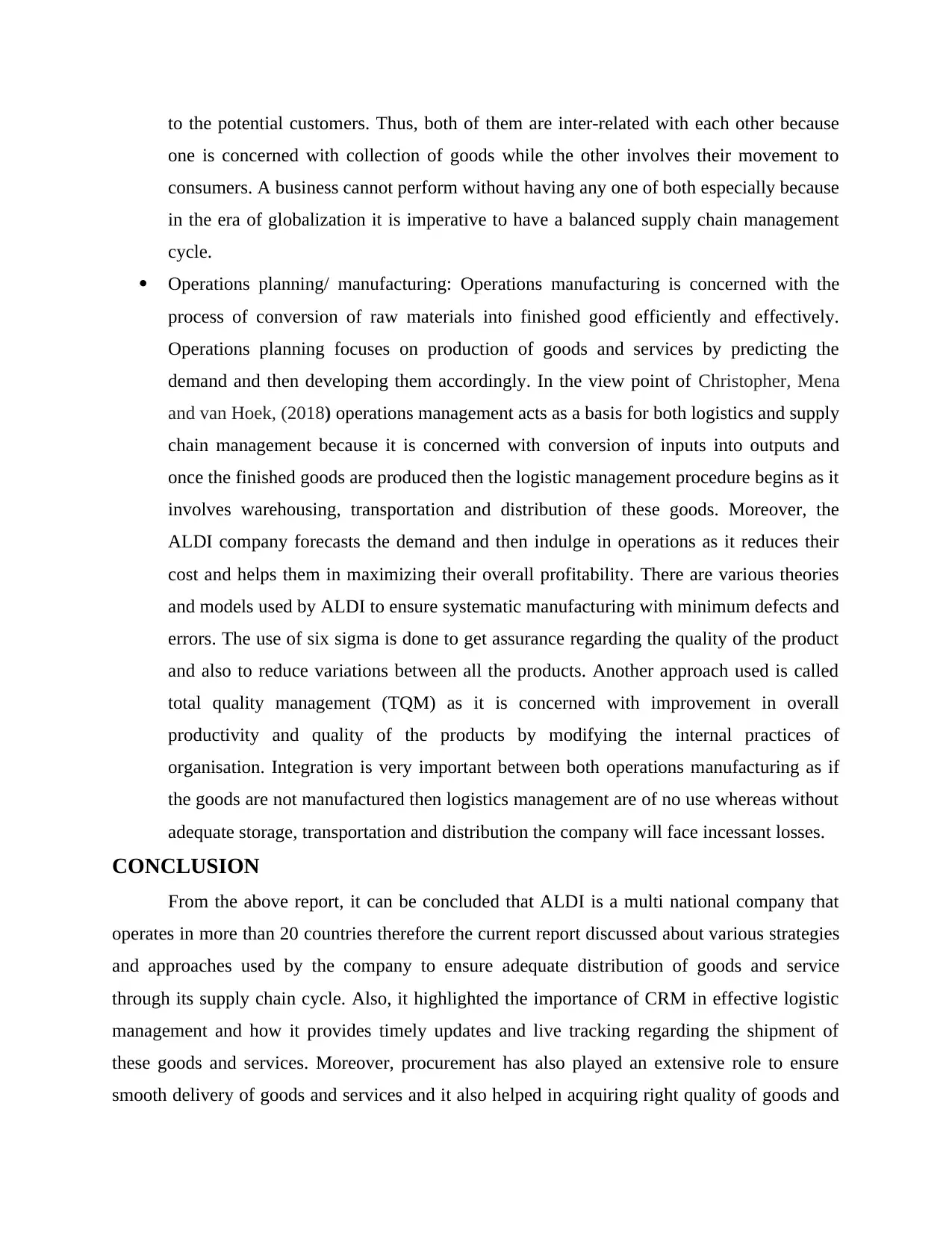
to the potential customers. Thus, both of them are inter-related with each other because
one is concerned with collection of goods while the other involves their movement to
consumers. A business cannot perform without having any one of both especially because
in the era of globalization it is imperative to have a balanced supply chain management
cycle.
Operations planning/ manufacturing: Operations manufacturing is concerned with the
process of conversion of raw materials into finished good efficiently and effectively.
Operations planning focuses on production of goods and services by predicting the
demand and then developing them accordingly. In the view point of Christopher, Mena
and van Hoek, (2018) operations management acts as a basis for both logistics and supply
chain management because it is concerned with conversion of inputs into outputs and
once the finished goods are produced then the logistic management procedure begins as it
involves warehousing, transportation and distribution of these goods. Moreover, the
ALDI company forecasts the demand and then indulge in operations as it reduces their
cost and helps them in maximizing their overall profitability. There are various theories
and models used by ALDI to ensure systematic manufacturing with minimum defects and
errors. The use of six sigma is done to get assurance regarding the quality of the product
and also to reduce variations between all the products. Another approach used is called
total quality management (TQM) as it is concerned with improvement in overall
productivity and quality of the products by modifying the internal practices of
organisation. Integration is very important between both operations manufacturing as if
the goods are not manufactured then logistics management are of no use whereas without
adequate storage, transportation and distribution the company will face incessant losses.
CONCLUSION
From the above report, it can be concluded that ALDI is a multi national company that
operates in more than 20 countries therefore the current report discussed about various strategies
and approaches used by the company to ensure adequate distribution of goods and service
through its supply chain cycle. Also, it highlighted the importance of CRM in effective logistic
management and how it provides timely updates and live tracking regarding the shipment of
these goods and services. Moreover, procurement has also played an extensive role to ensure
smooth delivery of goods and services and it also helped in acquiring right quality of goods and
one is concerned with collection of goods while the other involves their movement to
consumers. A business cannot perform without having any one of both especially because
in the era of globalization it is imperative to have a balanced supply chain management
cycle.
Operations planning/ manufacturing: Operations manufacturing is concerned with the
process of conversion of raw materials into finished good efficiently and effectively.
Operations planning focuses on production of goods and services by predicting the
demand and then developing them accordingly. In the view point of Christopher, Mena
and van Hoek, (2018) operations management acts as a basis for both logistics and supply
chain management because it is concerned with conversion of inputs into outputs and
once the finished goods are produced then the logistic management procedure begins as it
involves warehousing, transportation and distribution of these goods. Moreover, the
ALDI company forecasts the demand and then indulge in operations as it reduces their
cost and helps them in maximizing their overall profitability. There are various theories
and models used by ALDI to ensure systematic manufacturing with minimum defects and
errors. The use of six sigma is done to get assurance regarding the quality of the product
and also to reduce variations between all the products. Another approach used is called
total quality management (TQM) as it is concerned with improvement in overall
productivity and quality of the products by modifying the internal practices of
organisation. Integration is very important between both operations manufacturing as if
the goods are not manufactured then logistics management are of no use whereas without
adequate storage, transportation and distribution the company will face incessant losses.
CONCLUSION
From the above report, it can be concluded that ALDI is a multi national company that
operates in more than 20 countries therefore the current report discussed about various strategies
and approaches used by the company to ensure adequate distribution of goods and service
through its supply chain cycle. Also, it highlighted the importance of CRM in effective logistic
management and how it provides timely updates and live tracking regarding the shipment of
these goods and services. Moreover, procurement has also played an extensive role to ensure
smooth delivery of goods and services and it also helped in acquiring right quality of goods and
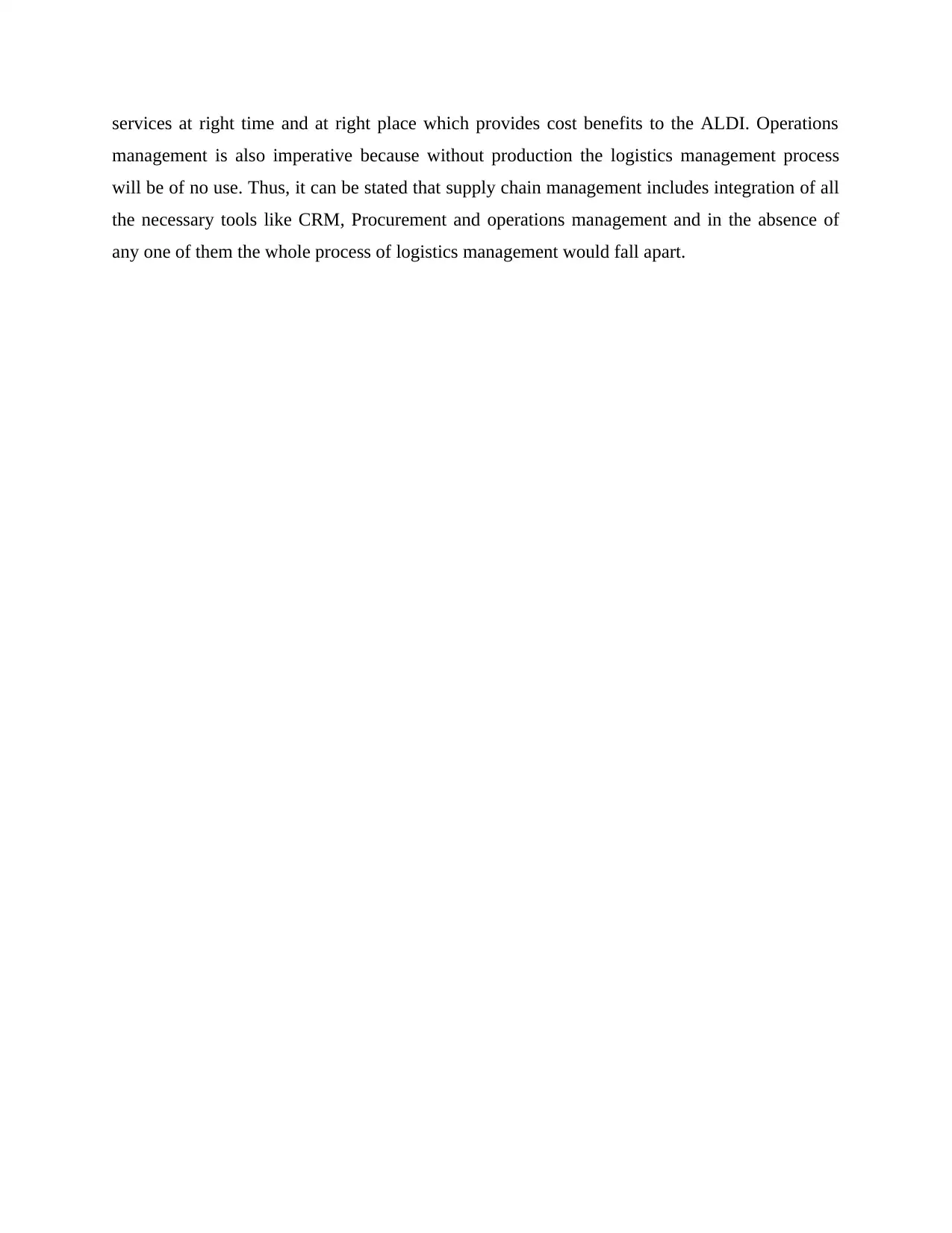
services at right time and at right place which provides cost benefits to the ALDI. Operations
management is also imperative because without production the logistics management process
will be of no use. Thus, it can be stated that supply chain management includes integration of all
the necessary tools like CRM, Procurement and operations management and in the absence of
any one of them the whole process of logistics management would fall apart.
management is also imperative because without production the logistics management process
will be of no use. Thus, it can be stated that supply chain management includes integration of all
the necessary tools like CRM, Procurement and operations management and in the absence of
any one of them the whole process of logistics management would fall apart.
⊘ This is a preview!⊘
Do you want full access?
Subscribe today to unlock all pages.

Trusted by 1+ million students worldwide
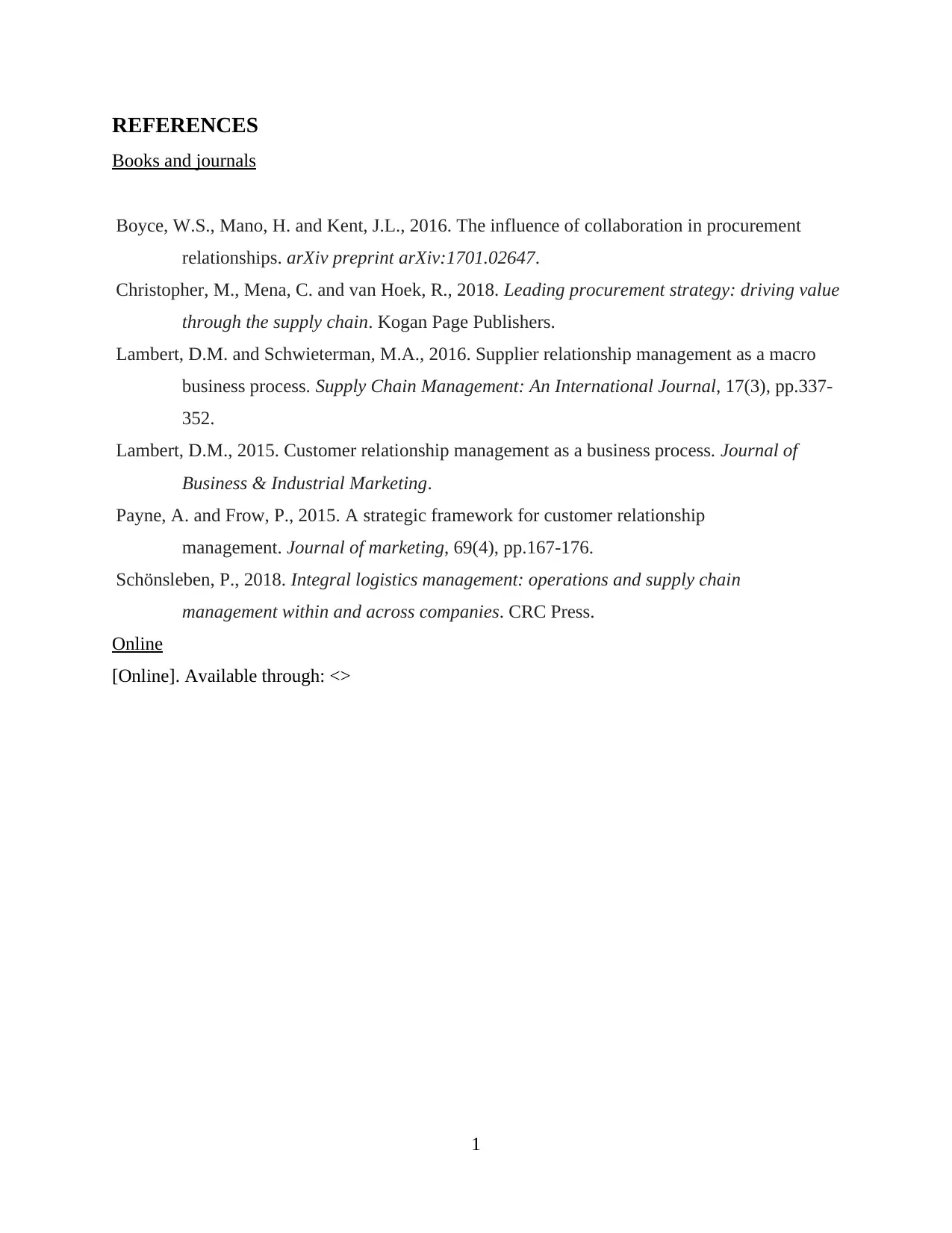
REFERENCES
Books and journals
Boyce, W.S., Mano, H. and Kent, J.L., 2016. The influence of collaboration in procurement
relationships. arXiv preprint arXiv:1701.02647.
Christopher, M., Mena, C. and van Hoek, R., 2018. Leading procurement strategy: driving value
through the supply chain. Kogan Page Publishers.
Lambert, D.M. and Schwieterman, M.A., 2016. Supplier relationship management as a macro
business process. Supply Chain Management: An International Journal, 17(3), pp.337-
352.
Lambert, D.M., 2015. Customer relationship management as a business process. Journal of
Business & Industrial Marketing.
Payne, A. and Frow, P., 2015. A strategic framework for customer relationship
management. Journal of marketing, 69(4), pp.167-176.
Schönsleben, P., 2018. Integral logistics management: operations and supply chain
management within and across companies. CRC Press.
Online
[Online]. Available through: <>
1
Books and journals
Boyce, W.S., Mano, H. and Kent, J.L., 2016. The influence of collaboration in procurement
relationships. arXiv preprint arXiv:1701.02647.
Christopher, M., Mena, C. and van Hoek, R., 2018. Leading procurement strategy: driving value
through the supply chain. Kogan Page Publishers.
Lambert, D.M. and Schwieterman, M.A., 2016. Supplier relationship management as a macro
business process. Supply Chain Management: An International Journal, 17(3), pp.337-
352.
Lambert, D.M., 2015. Customer relationship management as a business process. Journal of
Business & Industrial Marketing.
Payne, A. and Frow, P., 2015. A strategic framework for customer relationship
management. Journal of marketing, 69(4), pp.167-176.
Schönsleben, P., 2018. Integral logistics management: operations and supply chain
management within and across companies. CRC Press.
Online
[Online]. Available through: <>
1
Paraphrase This Document
Need a fresh take? Get an instant paraphrase of this document with our AI Paraphraser

2
1 out of 8
Related Documents
Your All-in-One AI-Powered Toolkit for Academic Success.
+13062052269
info@desklib.com
Available 24*7 on WhatsApp / Email
![[object Object]](/_next/static/media/star-bottom.7253800d.svg)
Unlock your academic potential
Copyright © 2020–2026 A2Z Services. All Rights Reserved. Developed and managed by ZUCOL.




